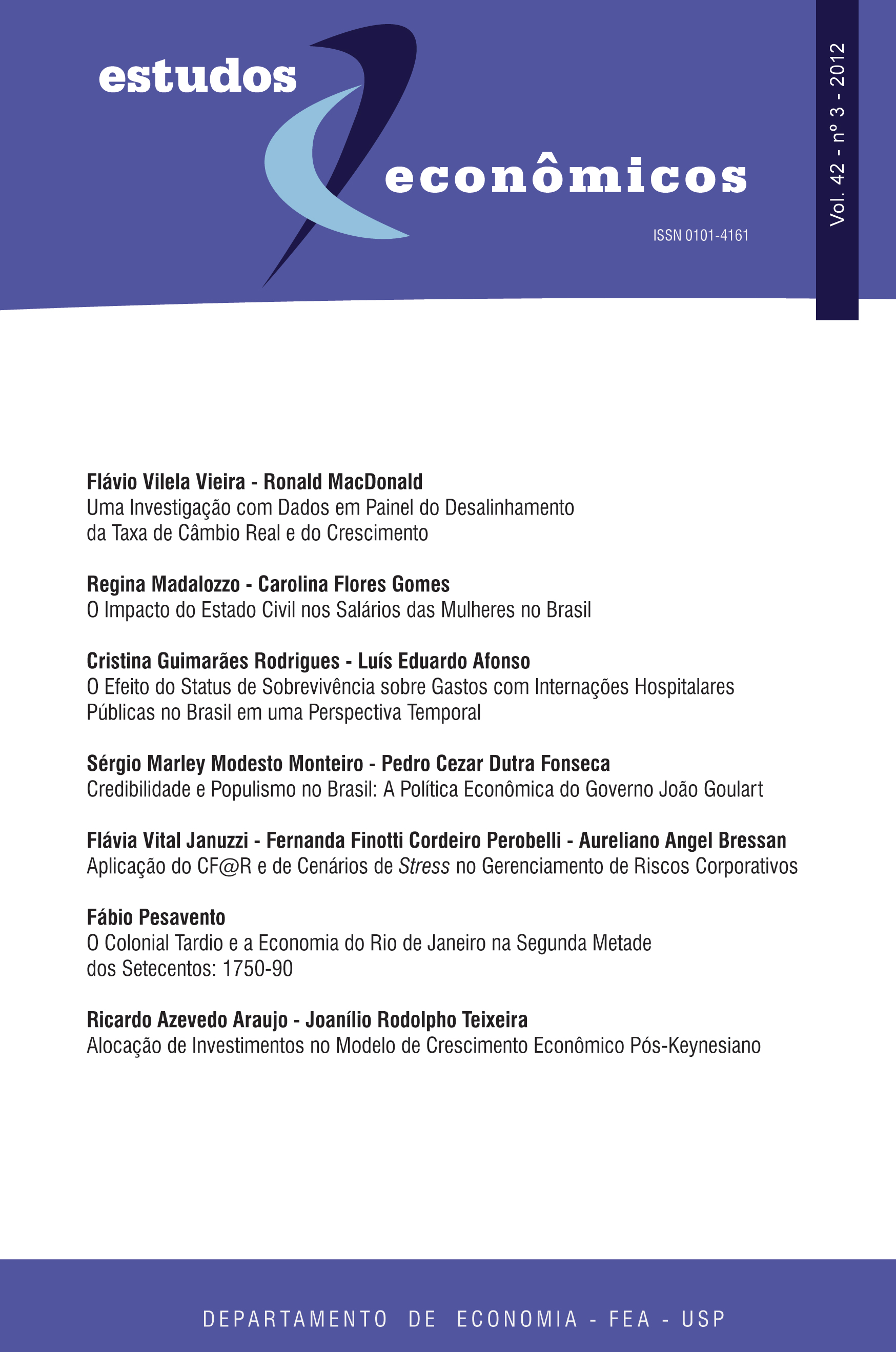Credibility and populism: the economic policy of the Goulart administrations in Brazil
DOI:
https://doi.org/10.1590/1980-53574234smpfKeywords:
populism, credibility, Brazil, João GoulartAbstract
The Goulart Administrations (1961-1964), which consisted of a parliamentary period and a presidential period, are considered typical examples of populism in Brazil. The literature usually defines economic policies advanced by these administrations as "hesitating", "irrational" or "ambiguous". We use a credibility model to argue that there is actually a consistent pattern in the manner in which economic policy was conducted. The credibility of the economic policies is defined to be the subjective probability that the government is following a monetary rule. Early on, the administrations enacted inflation-fighting measures. However, these policies were costly, and the administrations abandoned the course of austerity. As a result, their credibility was diminished, and attempts to achieve stabilization failed.
Downloads
References
ABREU, M. de P., A ordem do progresso: cem anos de política republicana, 1889-1989. (Rio de
Janeiro, 1989).
AGÉNOR, P. R.; Taylor, M. P., Analysing credibility in high-inflation countries: a new approach. The Economic Journal, v.103 (1993).
BAER, W., A economia brasileira. (São Paulo,1996).
BANDEIRA, M., O governo João Goulart: as lutas sociais no Brasil (1961-1964). (Rio de Janeiro, 1983).
BARRO, R., ‘Reputation in a model of monetary policy with incomplete information’. Journal of
Monetary Economics, 17(1986), pp. 1-20.
BASTOS, P. P. Z., O plano Trienal e sua economia política. In: O Plano Trienal e o Ministério do
Planejamento. (Rio de Janeiro, 2011).
BAXTER, M., The role of expectations in stabilization policy. Journal of Monetary Economics, v. 15, (1985).
BLACKBURN, K.; Christensen, M., Monetary policy and policy credibility: theories and evidence.
Journal of Economic Literature, v.27 (1989). Boletim Mensal da SUMOC, 1961-1964. Brasília.
BRASIL, Presidência da República. Plano Trienal de Desenvolvimento Econômico e Social: 1963-65. (Departamento de Imprensa Nacional, 1963).
CASTRO, P.R., Ronci, M. ‘Sixty years of populism in Brazil.’ In: Dornbusch, R., Edwards, S. The
macroeconomics of populism in Latin America. (Chicago, 1991).
CHRISTENSEN, M. Disinflation, credibility and price inertia. Applied Economics, v.19 (1987a).
CHRISTENSEN, M. On interest rate determination, testing for policy credibility, and the relevance of the Lucas critique. European Journal of Political Economy, v. 3 (1987b).
Conjuntura Econômica, 1961-1964. Rio de Janeiro, Fundação Getúlio Vargas.
CROUSHORE, D.; Koot, R. S., A measure of Federal Reserve credibility. Working Paper, n. 91-1
(Federal Reserve Bank of Philadelphia), 1991.
DORNBUSCH, R. Edwards, S. The macroeconomics of populism in Latin America. Journal of Development Economics, 32 (1990), pp. 247-277.
DORNBUSCH, R. Edwards, S. Edwards, S., The macroeconomics of populism in Latin America. (Chicago, 1991).
FONSECA, P. C. D. Vargas: o capitalismo em construção, 1906-1954. (São Paulo, 1989).
FONSECA, P. C. D. Legitimidade e credibilidade: impasses da política econômica do governo Goulart. Estudos econômicos, v. 34, n. 1(2004), pp. 587-622.
FURTADO, C., Um Projeto para o Brasil. (Rio de Janeiro, 1968).
GEWEKE, J., Exact inference in the inequality constrained normal linear regression model. Journal of Applied Econometrics, v.1 (1986).
IANNI, O., Estado e Planejamento Econômico no Brasil. (1930-1970). (Rio de Janeiro, 1986).
IBGE. Estatísticas históricas do Brasil. (Rio de Janeiro, 1990). Jornal do Comércio, 1961-64. Porto Alegre.
KREMERS, J. M., Gaining policy credibility for a disinflation. Staff Papers (International Monetary Fund), v.37 (1990).
LEFF, N. H., Política Econômica e Desenvolvimento no Brasil: 1947-1964. (São Paulo, 1977).
LESSA, C., Quinze anos de política econômica. (São Paulo, 1982).
LOUREIRO, F. P., Empresários, Trabalhadores e Grupos de Interesse: a Política Econômica nos Governos
Jânio Quadros e João Goulart, 1961-1964. (Tese de Doutorado, FFLCH/USP, São Paulo 2012)
LUCAS, R., Econometric policy evaluation: a critique. Journal of Monetary Economics (Conference Series on Public Policy, 1976).
MANKIW, G., et al. The adjustment of expectations to a change in regime: a study of the founding of the Federal Reserve. American Economic Review, v. 77, n.3 (1987). O CRUZEIRO, 1963. Rio de Janeiro. RELATÓRIO ANUAL da SUMOC, 1961-64. Brasília.
PERSSON, T.; Tabellini, G., (eds.). Monetary and fiscal policy. (Cambridge, 1994).
ROCHA, F., Monetary reform credibility: some evidence for Brazil. Estudos Econômicos, v.27, n.3, (1997).
SIMONSEN. M. H., Brasil 2001. (Rio de Janeiro, 1969).
SKIDMORE, T., Brasil: de Getúlio a Castelo. (Rio de Janeiro, 1976).
TAVARES, M.C. e Serra, J., Mais Além da Estagnação: Uma Discussão sobre o Estilo de Desenvolvimento Recente no Brasil. (n.p., 1972).
WELLS, J.R., ‘Growth and Fluctuations in the Brazilian Manufacturing Sector during the 1960’s and Early 1970’s’. (unpub. Diss., University of Cambridge, 1977).
Downloads
Published
Issue
Section
License
Copyright (c) 2012 Sérgio Marley Modesto Monteiro, Pedro Cezar Dutra Fonseca

This work is licensed under a Creative Commons Attribution-NonCommercial 4.0 International License.
By submitting an article, the author authorizes its publication and attests that it has not been submitted to any other journal. The original article is considered final. Articles selected for publication are proofread for grammatical and orthographic errors. The journal does not pay rights for published articles. The Institute of Economic Research from the School of Economics, Business and Accounting of the University of São Paulo (Instituto de Pesquisas Econômicas da Faculdade de Economia, Administração e Contabilidade da Universidade de São Paulo) owns the journal's copyright.




